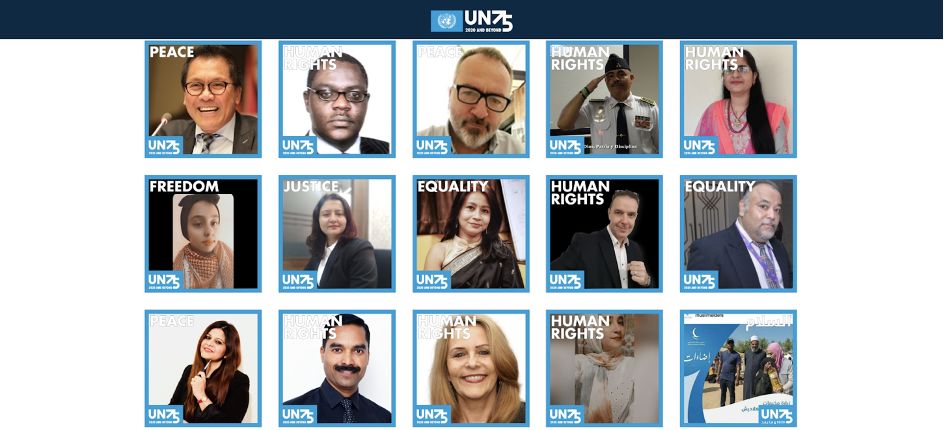United Methodists Called to Greet United Nations as it Turns 75
The UN turns 75 today. United Methodists have many reasons to celebrate!

Say Happy Birthday to the United Nations
This Saturday let us greet the United Nations a happy 75th birthday. United Methodists have many good reasons to do so. I do.
Today, and for the last 23 years, I have been representing the General Board of Church and Society of The United Methodist Church as a non-governmental and faith based organization at the United Nations. Our office across the UN at the Church Center for the United Nations has provided forthright witness to United Methodist understanding of local, national and global issues in the international arena, based on our church’s Social Principles and social teachings.
So, before October 24 goes, express your happy birthday greetings to the UN, and share a photo and a message that “We the peoples of the United Nations” and the United Methodist Church worldwide will read.
The United Methodist Church and the United Nations
Our United Methodist presence at the UN is not recent. As early as the 1950’s, Methodist voice in this multilateral institution has been represented by staff of the Methodist Board of Christian Social Concerns, the predecessor body of today’s General Board of Church and Society, and of the Woman’s Division of Christian Service of the Board of Mission, which is today’s United Methodist Women.
We can also claim that the Methodist family has been connected to the UN from its earliest days. On January 10, 1946, the opening and subsequent meetings of the UN General Assembly met at the Methodist Central Hall across Westminster Abbey in London. Today, these three agencies of the United Methodist Church—Church and Society, Global Ministries and United Methodist Women—and the World Federation of Methodist and Uniting Church Women, each have a UN consultative status and corresponding representatives at UN centers.
Social witness at the UN and international arenas United Methodist presence at UN meetings in many parts of the world have afforded United Methodists a space and opportunity to help shape multilateral policy but also public opinion in countries where United Methodists reside. United Methodists are also active members and leaders of other nongovernmental organizations, like the Conference of Non-Governmental Organizations in Consultative Relationship with the United (CoNGO) and United Nations Associations in their respective countries. As such, they help shape public policy at grassroots, national and international arenas.
GBCS amplifies the official position of the general church by speaking to issues that are at the core of UN work. Most recently, GBCS has expressed sentiment in support of and/or have signed on to these global statements, and in support of ongoing work, in so far as they aligned with United Methodist stance:
- Cancellation of onerous debts especially at a time of pandemics. See Open Letter for Debt Justice.
- Crucial role of women in peace and security agenda. See Open Letter on the 20th Anniversary of UN Security Council Resolution 1325.
- Eliminating systemic racism. See Integrating the Elimination of Systemic Racism, and Racial and Ethnic Discrimination, into the Implementation of the SDGs.
- Emerging from COVID-19 and building back better, and justly. See COVID-19 Recovery: Building Back Better.
- Supporting the COVID-19 solidarity fund of the World Health Organization.
- Saying yes to food security and no to hunger as a weapon of war. See CoNGO Statement on 2020 Nobel Peace Prize to UN World Food Programme.
- Congratulating the United Nations for turning 75 years old. See CoNGO Declaration on UN75.
- Supporting the role of the UN for free, fair, honest and safe elections everywhere. See Prayer for U.S. Elections.
Today, I will be a featured panelist in a webinar originating from India, hosted by Transbiblica and the Evangelical Fellowship of India, exploring the topic The Role of the Church at the United Nations. Please join me in the webinar if you have time.
The United Methodist Church says this in our Social Principles: “Believing that international justice requires the participation of all peoples and nations, we endorse the United Nations, its related bodies…as the best instruments now in existence to achieve a world of justice and law.” (¶165, VI.D)
More than any time now is when we need such multilateral institutions like the UN so that peoples and nations around the world can collaborate globally in addressing multiple pandemics, not the least COVID-19, racism, hunger, violence and so much more. Such collaboration is not unlike United Methodist connectionalism that allows us to join with others in ministry together to eliminate these pandemics and so much more.
Have you taken your picture yet?